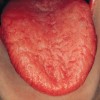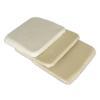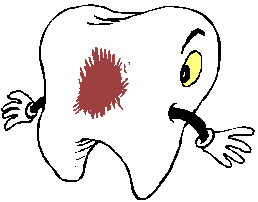 Xerostomia (the feeling of dry mouth) is common especially in older adults. Causes include medications, autoimmune disease (Sjögren’s Syndrome), radiotherapy or chemotherapy for cancer, hormone disorders, and infections.
Xerostomia (the feeling of dry mouth) is common especially in older adults. Causes include medications, autoimmune disease (Sjögren’s Syndrome), radiotherapy or chemotherapy for cancer, hormone disorders, and infections.
This Cochrane review evaluated the evidence for topical treatments to reduce symptoms. Continue reading Treatments for dry mouth →
 Acute otitis media is the most common bacterial infection among young children in the United States.
Acute otitis media is the most common bacterial infection among young children in the United States.
In this Cochrane review, the results of studies of xylitol to prevent acute otitis media in children up to 12 years old were evaluated. Continue reading Chewing gum to prevent otitis media →
 Â Researchers from Ain Shams University, in Cairo, Egypt report it’s safe, well tolerated, and associated with rapid resumption of intestinal motility and shorter hospital stay. Continue reading Chewing gum aids bowel motility after caesarean →
 Researchers from Ain Shams University, in Cairo, Egypt report it’s safe, well tolerated, and associated with rapid resumption of intestinal motility and shorter hospital stay. Continue reading Chewing gum aids bowel motility after caesarean →
 In England, there were more than 31,000 operations to remove a section of the large intestine (colectomy) from 2004 to 2005. These patients average 13 to 26 days in the hospital.
In England, there were more than 31,000 operations to remove a section of the large intestine (colectomy) from 2004 to 2005. These patients average 13 to 26 days in the hospital.
Might chewing gum help? Continue reading Benefit of chewing gum on recovery from colon surgery →
 NewsWise reports that research presented during the 2007 Annual Scientific Meeting of The Obesity Society, supports the role of chewing gum as an easy, practical tool for weight management. Continue reading Chewing gum to reduce caloric intake →
NewsWise reports that research presented during the 2007 Annual Scientific Meeting of The Obesity Society, supports the role of chewing gum as an easy, practical tool for weight management. Continue reading Chewing gum to reduce caloric intake →
 The Zoft Gum Company, which makes several herbal supplement chewing gums (eg, breast enlargement, weight reduction) has introduced a new gum to help manage the symptoms of menopause.
The Zoft Gum Company, which makes several herbal supplement chewing gums (eg, breast enlargement, weight reduction) has introduced a new gum to help manage the symptoms of menopause.
There are no studies of this gum for treating menopausal symptoms in women. And the discussion of the gum’s ingredients on the Zoft website is misleading.
This summary should provide balance. Continue reading Zoft Menopause Gum →
 A surgical procedure called a colonectomy removes part or all of the large intestine. A common side effect of this surgery is known as postoperative ileus (POI) in which bowel movement is impaired following surgery and can take 48 to 72 hours to recover.
A surgical procedure called a colonectomy removes part or all of the large intestine. A common side effect of this surgery is known as postoperative ileus (POI) in which bowel movement is impaired following surgery and can take 48 to 72 hours to recover.
Common symptoms experienced by patients with POI include bloating, pain, nausea and vomiting, an inability to pass stools, and an inability to eat solid food. There is also a greater risk for other complications that can prolong the time they must stay in the hospital. This, of course, results in higher health care costs.
A recently published study of 66 patients was designed to determine the usefulness of gum chewing to shortening the time to recovery from POI.
Continue reading Gum chewing vs acupressure wrist bracelet to shorten postcolectomy ileus →
 Two companies in Germany, BASF and Organo Balance, are collaborating to develop products based on probiotics that, if successful, could be marketed to improve dental hygiene.
Two companies in Germany, BASF and Organo Balance, are collaborating to develop products based on probiotics that, if successful, could be marketed to improve dental hygiene.
Here are the details.
Continue reading More probiotics being developed to prevent tooth decay →
Complementary and Alternative Medicine: Fair, Balanced, and to the Point
 Xerostomia (the feeling of dry mouth) is common especially in older adults. Causes include medications, autoimmune disease (Sjögren’s Syndrome), radiotherapy or chemotherapy for cancer, hormone disorders, and infections.
Xerostomia (the feeling of dry mouth) is common especially in older adults. Causes include medications, autoimmune disease (Sjögren’s Syndrome), radiotherapy or chemotherapy for cancer, hormone disorders, and infections.
 Â Researchers from Ain Shams University, in Cairo, Egypt
 Researchers from Ain Shams University, in Cairo, Egypt  A surgical procedure called a colonectomy removes part or all of the large intestine. A common side effect of this surgery is known as postoperative ileus (POI) in which bowel movement is impaired following surgery and can take 48 to 72 hours to recover.
A surgical procedure called a colonectomy removes part or all of the large intestine. A common side effect of this surgery is known as postoperative ileus (POI) in which bowel movement is impaired following surgery and can take 48 to 72 hours to recover.